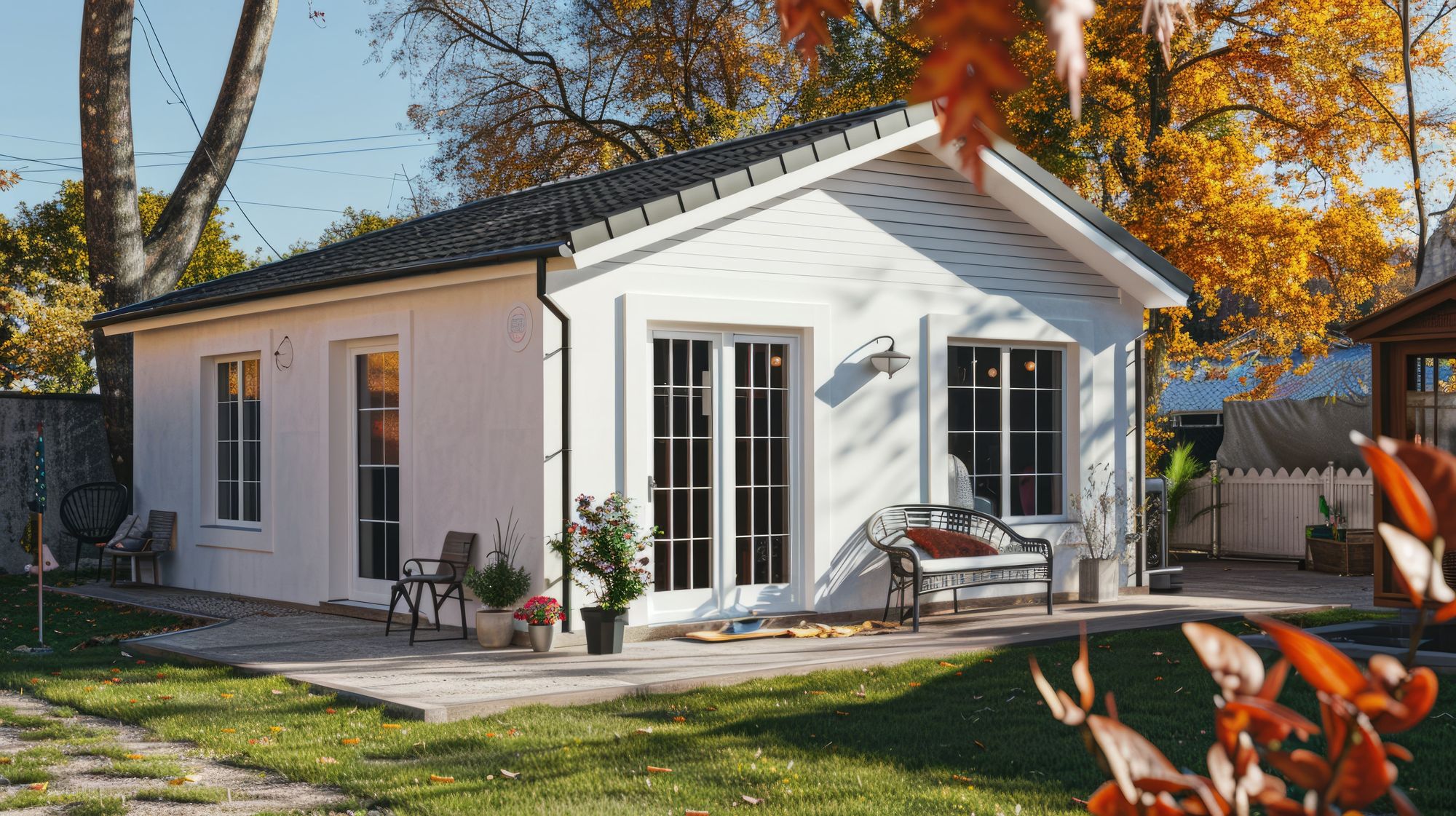Understanding ADU Financing Landscape
Financing an ADU in California has evolved significantly, with new loan products, government incentives, and creative funding strategies emerging to support the growing accessory dwelling unit market. Understanding your options is crucial for project success.
Why ADU Financing is Unique
- Property Enhancement: ADUs add value rather than replace existing structures
- Income Generation: Potential rental income improves loan qualification
- Government Support: Multiple incentive programs encourage ADU development
- Market Evolution: Lenders increasingly understand ADU value and risk profiles
Traditional Financing Options
Several established financing methods work well for ADU projects:
Home Equity Line of Credit (HELOC)
- Best for: Phased construction with flexible draw-downs
- Typical rates: Prime + 0.5% to 2.5% (variable)
- Credit line: Up to 80-90% of home value minus existing mortgage
- Pros: Pay interest only on funds used, flexible repayment
- Cons: Variable rates, potential payment increases
Home Equity Loans
- Best for: Fixed-cost projects with predictable timelines
- Typical rates: 2-4% above prime (fixed)
- Loan amounts: $20,000 - $500,000+
- Pros: Fixed rates and payments, lump sum funding
- Cons: Less flexible than HELOC, higher rates than first mortgages
Cash-Out Refinancing
- Best for: Large projects when mortgage rates are favorable
- Typical rates: Current mortgage rates (often lowest option)
- Cash available: Up to 80% of appraised value minus existing mortgage
- Pros: Lowest interest rates, single payment
- Cons: Closing costs, extending mortgage term
Construction Loans
Specialized construction financing addresses unique building project needs:
Traditional Construction Loans
- Structure: Interest-only during construction, convert to permanent financing
- Draw schedule: Funds released based on construction milestones
- Typical terms: 6-12 month construction period
- Requirements: Detailed plans, contractor agreements, cost estimates
Construction-to-Permanent Loans
- Convenience: Single closing for construction and permanent financing
- Rate lock: Permanent loan rate locked at application
- Reduced costs: One set of closing costs instead of two
- Streamlined process: Less paperwork and fewer qualification hurdles
ADU-Specific Loan Programs
New lending products designed specifically for accessory dwelling units:
ADU Construction Loans
- Specialized underwriting: Lenders experienced with ADU projects
- Streamlined approval: Faster processing for standard ADU plans
- Competitive rates: Often better than traditional construction loans
- Flexible terms: Accommodation for ADU-specific requirements
Rental Income Qualification
- Income consideration: Projected ADU rental income in qualification
- Market analysis: Professional appraisal of rental potential
- Conservative estimates: Typically 70-75% of projected rent counted
- Debt-to-income improvement: Rental income can improve loan qualification
Government Incentive Programs
Multiple government programs provide financial support for ADU development:
California ADU Grant Programs
- CalHFA ADU Grant Program: Up to $40,000 for low-income homeowners
- HCD Pre-Development Loan Program: Planning and design funding
- Local city programs: Many cities offer additional incentives
- Utility rebates: Energy efficiency and solar installation incentives
Federal Tax Incentives
- Solar Investment Tax Credit: 30% credit for solar installations
- Energy efficiency credits: Heat pumps, insulation, windows
- Depreciation benefits: Rental property depreciation deductions
- Business deductions: Professional fees and financing costs
Local Financing Programs
Many California cities have developed ADU-specific financing assistance:
Los Angeles Programs
- LA ADU Accelerator Program: Pre-approved plans and financing connections
- LADWP incentives: Electrical service upgrade rebates
- Seismic retrofit financing: Low-interest loans for earthquake safety
San Francisco Bay Area
- BAHFA funding: Regional housing finance authority programs
- County-specific programs: Santa Clara, Alameda County initiatives
- City programs: San Jose, Oakland, Berkeley local assistance
San Diego Programs
- City of San Diego ADU bonuses: Development impact fee reductions
- County programs: Unincorporated area assistance
- Utility partnerships: SDG&E energy efficiency programs
Alternative Financing Strategies
Creative approaches can overcome traditional financing limitations:
Personal Loans
- Quick approval: Faster than secured loan options
- No collateral: Based on creditworthiness alone
- Fixed terms: Predictable payments over 3-7 years
- Higher rates: Typically 6-15% depending on credit
Credit Cards and Lines of Credit
- Short-term financing: Bridge funding during project phases
- Promotional rates: 0% APR offers for qualified borrowers
- Flexible use: No restrictions on fund usage
- Risk consideration: High rates if not paid quickly
Family and Private Financing
- Family loans: Potentially lower rates and flexible terms
- Private investors: Partnership arrangements for larger projects
- Seller financing: For properties purchased specifically for ADU development
- Legal documentation: Proper contracts protect all parties
Financing Strategy by Project Type
Different ADU projects benefit from different financing approaches:
Garage Conversions ($80,000 - $180,000)
- Best options: HELOC, home equity loan, personal loan
- Considerations: Lower costs may not justify construction loan complexity
- Timeline: 3-6 months typical completion
New Detached ADUs ($180,000 - $350,000)
- Best options: Construction loans, cash-out refinancing
- Considerations: Longer timeline benefits from construction loan structure
- Timeline: 9-15 months from design to completion
Luxury ADUs ($350,000+)
- Best options: Cash-out refinancing, asset-based lending
- Considerations: Higher loan amounts may require portfolio lenders
- Timeline: 12-18 months for complex projects
Qualification Requirements
Understanding lender requirements helps prepare successful applications:
Credit Requirements
- Excellent credit (740+): Best rates and terms available
- Good credit (680-739): Standard rates with some limitations
- Fair credit (620-679): Higher rates, may require more documentation
- Below 620: Limited options, consider credit improvement first
Income and Debt Considerations
- Debt-to-income ratio: Typically must be below 43-50%
- Income documentation: W-2s, tax returns, bank statements
- Employment history: 2+ years stable employment preferred
- Rental income potential: May count toward qualification
Property Requirements
- Equity position: Typically need 15-20% equity for most programs
- Property type: Single-family homes generally preferred
- Occupancy: Primary residence usually required
- Property condition: Must meet basic habitability standards
Application Process and Timeline
Understanding the financing timeline helps coordinate with construction schedules:
Pre-Qualification Phase (1-2 weeks)
- Credit check and initial review: Basic qualification assessment
- Documentation gathering: Income, asset, and property information
- Rate shopping: Compare offers from multiple lenders
- Program selection: Choose optimal financing structure
Application and Underwriting (3-6 weeks)
- Formal application: Complete documentation submission
- Property appraisal: Current value and projected value assessment
- Plan review: Construction documents and cost verification
- Final approval: Loan committee review and approval
Closing and Funding (1-2 weeks)
- Final documentation: Loan documents and contractor agreements
- Closing process: Sign documents and establish accounts
- Initial funding: First draw or lump sum distribution
- Ongoing draws: Construction milestone-based funding
Cost Optimization Strategies
Smart financing choices can significantly reduce project costs:
Rate Shopping
- Multiple quotes: Compare at least 3-5 lenders
- Rate timing: Lock rates when favorable
- Fee negotiation: Many fees are negotiable
- Credit union options: Often offer competitive rates
Tax Strategy Coordination
- Deduction timing: Coordinate with tax planning
- Business entity consideration: LLC or partnership structures
- Professional consultation: CPA advice on optimal structure
Risk Management
Protecting your investment through proper risk management:
Insurance Considerations
- Builder's risk insurance: Protection during construction
- Liability coverage: Adequate limits during construction
- Property insurance adjustment: Update coverage for increased value
- Rental insurance: Landlord coverage for rental ADUs
Contract Protection
- Performance bonds: Contractor completion guarantees
- Lien waivers: Protection from subcontractor claims
- Change order controls: Budget protection mechanisms
- Completion guarantees: Timeline and quality assurance
Professional Guidance
ADU financing involves complex decisions affecting both immediate costs and long-term returns. Our team provides comprehensive financing guidance, connecting you with optimal loan programs and ensuring your project is properly structured for success.
Ready to explore financing options for your ADU project? Contact us for personalized financing strategy consultation and connection with our network of ADU-specialized lenders.



